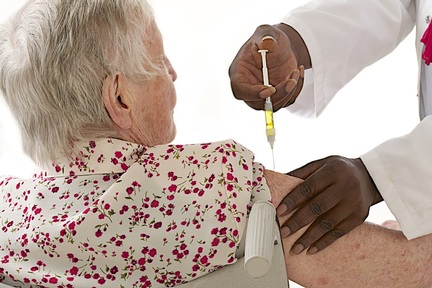Spike in flu and dementia responsible for high death rate
The growing number of cases of dementia and an ineffective flu vaccine has contributed to the largest rise in deaths in England and Wales for more than 50 years, according to the Office for National Statistics (ONS).

The report identified an additional 28,189 deaths last year, compared with 2014, the largest percentage increase since 1968.
Hilary Evans, chief executive of Alzheimer’s Research UK, said: “This analysis further underlines the devastating impact of dementia and the scale of the challenge we face.
“In recent decades advances in research have successfully reduced the number of deaths from other conditions such as heart disease, but these figures highlight a stark truth: currently no-one survives a diagnosis of dementia.
“Research has the power to defeat dementia, but we must invest in research if we are to find the treatments and preventions that are so desperately needed.”
Official statistics published last month showed that in 2015, there were 529,613 deaths registered in England and Wales – up 5.6 per cent from the previous year, and the highest number of total deaths since 2003.
The largest increase in deaths from 2014 was in the over 75 age group, with 69 per cent of all deaths in 2015 occurring in people aged 75 and over. Deaths among those aged 90 and over were also 9.3 per cent higher than they had been in the previous year.
The majority of the increase in deaths were found to be caused by Alzheimer’s or other dementias, while others were reported in the early part of the year, coinciding with a peak in the flu virus. The report also highlights that the main strain of flu that was circulating during 2015 was known to affect older people in particular.
Ms Evans added: “With an ageing population, the number of people with dementia is increasing and there are currently no treatments to slow or stop diseases like Alzheimer’s. It’s likely that some of the increase may be down to improvements in diagnosis rates, and the fact that dementia is increasingly being acknowledged as a cause of death on official death certificates.
“We know that in the later stages of dementia people can be more prone to infections, and it’s also likely that the increase in respiratory diseases in 2015 drove some of the increase in deaths from dementia during this period.”
Jeremy Hughes, chief executive of Alzheimer’s Society, commented: “With one in six deaths in England and Wales of people over the age of 75 now attributed to dementia, these findings serve as a stark reminder of the need for good community care to support the most vulnerable.
"People living with dementia often have a lowered immune system and so are at a greater risk of contracting flu viruses. The condition also makes it harder for people to look after themselves and in the cold winter months this can become a real danger.
“This increase also reflects more accurate recording and increased awareness of dementia. Health and care staff are increasingly recognising dementia as a cause of death as opposed to a natural part of ageing. By 2025 over one million people will have the condition, with this number only set to increase, making it one of the biggest health and social care challenges we face.”
Latest News
 29-Jul-24
Dementia Bus gives carehome.co.uk staff insight into life with dementia
29-Jul-24
Dementia Bus gives carehome.co.uk staff insight into life with dementia
 01-Mar-24
Find out the top care homes in 2024
01-Mar-24
Find out the top care homes in 2024
 21-Mar-23
UK's top care homes in 2023 revealed
21-Mar-23
UK's top care homes in 2023 revealed
 03-Jan-23
carehome.co.uk launches free care helpline
03-Jan-23
carehome.co.uk launches free care helpline
 13-Dec-22
5 mins with Emily Whitehurst, chief operating officer for Constantia Healthcare
13-Dec-22
5 mins with Emily Whitehurst, chief operating officer for Constantia Healthcare